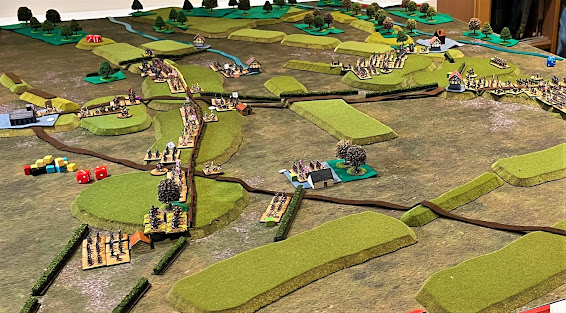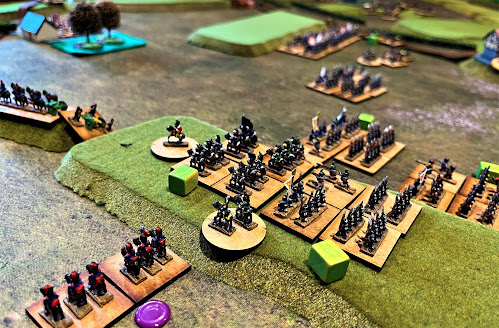The grand projet of compiling a book of BBB scenarios for all of Napoleon's bloodiest, biggest battles approaches completion. One rather important ingredient of that set is Waterloo. We first visited this for the bicentenary in 2015, when we did a demo game at our local military museum; reprised it later that year; then I ran it for my US buddies in 2016. Mark has now taken my original scenario and tweaked and polished it a bit. This week we playtested his version.
Everyone knows Waterloo. Napoleon is trying to prevent Wellington and Blücher from combining against him, so he needs to beat Wellington before Blücher turns up. In game terms, he has to hold 4 of the 5 Objectives for a win or 3 for a draw. These are Hougoumont, La Haye Sainte and Papelotte, which define the Allied line (Papelotte also represents a wedge between Wellington and the Prussians); and Plancenoit and Mont St Jean representing the French and Allied lines of communications. The French also lose an objective if either of the two Old Guard infantry units becomes Spent. (I know there are wargamers who think it is stupid to make Hougoumont an objective. I refer you to my essay, 'Victory Conditions in Wargames'. See also the thoughts at the end of this post.)
Dave donned Picton's top hat. Crispin put on his Wellingtons. Phil, with his particular affection for d'Erlon's corps, took the French right, leaving me to command the left and the Guard. Mark refereed and controlled the Prussians once they arrived.
The Allied line looked dauntingly solid. Phil and I decided not to attack it head-on. Our plan was an initial right hook with both d'Erlon and Lobau, while we built a grand battery to pummel the Allied centre. Reille was to shift right and sit behind the grand battery to keep us balanced. As for where to commit the Guard, that would depend how the first few turns went.
Eight pics below tell the story of how this plan worked out, followed by some reflections on the game as usual.
Reflections:
Waterloo - it's a classic. Obviously it gets played and replayed so much because it is so famous and such an emblematic pinnacle of a quarter-century of the Revolutionary and Napoleonic Wars. But it also gets replayed because it has genuine replay value. We players try all sorts of different plans to prove that we're smarter than Napoleon. Left hooks, right hooks, smashmouth, combinations thereof, and the ultimate question of where to commit the Guard ... Mark described our French plan this time as 'very elegant'. Maybe so, but it still didn't work!
Identifying (and identifying with) units. Another good thing about Waterloo is that the commanders, formations and regiments are so familiar. It definitely helps bring a game to life when we can talk about 'committing the Household Brigade' rather than 'those red cavalry', or say 'stand firm the 52nd!', or when Dave can command his beloved Nassauers, etc. That in turn helps with players' engagement with the game. Quote of the night: 'I don’t think I have ever felt quite so emotionally immersed in a game – from frustration to elation to admiration to regret and finally despair!' (and bear in mind this was not that player's first rodeo).
Marshalling large forces. Echoing what I said after January's Borodino game, with over 20 units a side you really feel as though you are shifting weighty masses of troops around the table. Committing the Guard becomes a much more substantial decision when it's five potent units (plus artillery) rather than just one or two. It definitely gives a meaty, bloody big battle feel and makes it easier to pretend you're a Marshal of France.
Hougoumont: red herring or precious prize? I mentioned the fact that some think it is stupid to make Hougoumont an objective. There is certainly a case to be made that the historical French attack on Hougoumont was poorly planned and executed and didn't need to happen when it did. I am less sure about whether Napoleon could have ignored entirely. In our game, it wasn't my initial focus - I wanted to win by scrubbing away the weaker and less well ensconced units supporting it - but the chateau was a thorn in my side, and I actually found I needed to storm the chateau to break the line behind it anyway. If Napoleon wants to ignore the chateau, that means ignoring the Allied right. What does he do instead? As the scenario stands, the French don't have to take Hougoumont to win, but making it an Objective rewards them if they do capture this key to unlocking one sector of the Allied position. I think that's reasonable.










